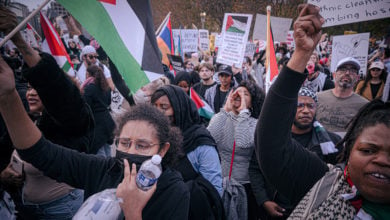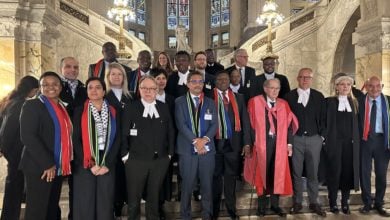The author traveled to Syria in December 2005 to attend an international conference on Palestinian refugees and the right of return. He spoke at the conference as a representative of the U.S. anti-war movement for the ANSWER Coalition (Act Now to Stop War and End Racism).
 Richard Becker condemns U.S.-French anti-Syria campaign at a Dec. 15, 2005 press conference in Damascus, Syria. |
Bogged down in Iraq, the Bush administration is nevertheless pushing forward its project to dominate the entire Middle East—with the full backing of the Democratic Party leadership.
Syria in particular is being targeted. Using a series of bomb assassinations in neighboring Lebanon as the pretext, Washington is aggressively seeking to isolate Syria in order to bring about “regime change” in Damascus. The U.S. leaders, in alliance with the former colonial overlords of the region, France and Britain, are using the United Nations Security Council in their campaign to overturn the Syrian government.
The full-court press against Syria began in February 2005. On Feb. 14, Rafik Hariri, a billionaire construction contractor and former prime minister of Lebanon, was killed along with 20 other people by a huge bomb explosion in Beirut, Lebanon’s capital. Washington and pro-U.S. elements in Lebanon immediately and without any evidence blamed Syria. The United States demanded that Syria immediately remove its military forces, which had been in Lebanon since the height of the Lebanese civil war in 1976.
Prompted by the United States and France, the UN Security Council set up a special committee led by German diplomat Detlef Mehlis to investigate the bombing. Under intense pressure from the same countries, Syria withdrew its 14,000 troops from Lebanon by April 2005. But this concession did nothing to deflect the imperialist campaign.
On Oct. 31, 2005, the Security Council passed Resolution 1636, demanding “unconditional cooperation” from Syria in carrying out the investigation. While devoting unlimited resources to the investigation of the Hariri assassination, the Council has given no indication that it intends to “investigate” the catastrophic war and occupation in neighboring Iraq.
In Iraq, more than 100,000 people have died since March 2003 in a war justified entirely on the basis of deliberate falsifications by the U.S. government. The stark contrast in the approach to Lebanon and Iraq demonstrates that what the United Nations chooses to investigate has nothing to do with either facts or justice.
It is instead determined by who is a world power and who is not. No matter what atrocities or acts of state terrorism they carry out, the U.S., British and French imperialists are never subject to investigation or sanctions of any kind.
While the campaign against Syria went into high gear in early 2005, the writing on the wall was visible much earlier. On April 10, 2003, the day after the fall of Baghdad to U.S. troops, State Department official John Bolton warned that Syria, Iran and North Korea should, “heed the lesson of Iraq.” Today, Bolton is the U.S. ambassador to the United Nations, where he is the chief organizer of the diplomatic offensive against Syria.
In September 2004, the United States and France pushed Resolution 1559 through the Security Council, demanding that Syria remove its troops from Lebanon and that the Lebanese and Palestinian popular militias in the country be disbanded. The intent was to open the way for the right-wing and pro-imperialist forces to reassert control over Lebanon. Although less immediately apparent, another aim was to bring down the Syrian government.
Washington’s method of aggression
Washington’s methods of aggression should no longer be a mystery to anyone. First, the decision is made to target a particular country. Then the “evidence” is collected—or fabricated—to justify the attack. The Iraq invasion is the most glaring example in recent times, where the supposed threat of Iraq’s non-existent “weapons of mass destruction” was used to justify the destruction and takeover of the country.
The same method is now being applied to Syria with the same objective—the overthrow of the government and the end to Syria’s existence as an independent and sovereign state. But the means of achieving regime change in Syria are somewhat different than those used against Iraq.
The U.S. military is bogged down in Iraq, where it has suffered significant losses and is further from victory than it was when it entered Baghdad nearly three years ago. The cost of the war is around $240 million per day, and is now projected to total between $1 trillion and $2 trillion, depending on the duration.
Another intervention of the same type against Syria—or Iran, the other main state target of the United States in the region—is not really feasible at this time.
But the U.S. government has many coercive instruments at its disposal. There are already unilateral U.S. economic sanctions in place, and there is the real danger of UN sanctions like those that devastated neighboring Iraq from 1990 to 2003. Obvious attempts are also being made to split the Syrian government and military establishment.
 Photo: Richard Becker |
Syria is largely surrounded by U.S. military power or allies. Turkey is a member of NATO. Israel, which still occupies part of Syrian territory, has the world’s fifth-largest military. Jordan, to the south, is a U.S. dependency, and Iraq, with which Syria shares a long border, is occupied by U.S. troops. Numerous U.S. military operations have been conducted very close to the Syrian border in recent months.
Off Syria’s Mediterranean coast is the U.S. Navy’s Sixth Fleet. Between the fleet, its regional bases and Israel, Washington has massive air power on call.
The United States and France are using a strategy of isolating Syria, threatening it with economic sanctions and possible military action and cultivating internal dissension through a carrot-and-stick policy. The aim is to disintegrate the government and state from within in order to bring Syria down.
The consequences of such a development would be catastrophic for the people of Syria and the entire region. The U.S. government has openly stated that it wishes to open Syria’s economy to foreign capital penetration. Now, Damascus and other cities in the country of 18 million people are not cluttered by McDonald’s, Pizza Hut, Gap or other U.S.-based chains.
A developing country, Syria is self-sufficient in food and energy. If restrictions were lifted and international capital given free rein, Syria’s national economy would be overwhelmed, to the detriment of the vast majority of people. It would signify the subjugation of Syria and its return to neo-colonial status.
Regime change in Syria would be a tremendous loss to the Palestinian struggle and would weaken the greater Arab world. Damascus is the only place where many Palestinian organizations can maintain offices and have some limited breathing space. One of the long-standing demands of U.S. imperialists is that Syria ban these organizations.
Regime change in Syria would also be a disaster for the Lebanese people and Palestinian refugees in that country. It is just another big lie that the United States is acting in “defense of Lebanon” or “democracy.”
A false ‘investigation’
A key element in the U.S. campaign to isolate Syria is its attempt to demonize Syrian president Bashar al-Assad and his government by blaming them for the recent assassinations and attempted assassinations in Lebanon.
On Dec. 11, 2005, Gebran Tueni, a member of the Lebanese parliament and publisher of the right-wing, anti-Syrian newspaper An-Nahar, was killed by a powerful bomb in Beirut. This was undoubtedly a very sophisticated operation, carried out with high-level intelligence and technology.
 Political banner in a Damascus marketplace. Photo: Richard Becker |
Immediately, and before any investigation could take place, anti-Syrian and pro-Western Lebanese politicians and U.S. officials pointed the finger at the Syrian government.
The accusation made no sense at all. Dec. 11 was the same day that the second Mehlis report was to be received by the UN Security Council regarding the Rafik Hariri murder. The first report was discredited by the fact that two of the “witnesses” that Mehlis had relied on recanted their testimony—one saying he had been bribed, the other saying he had been threatened into giving testimony damaging to Syria.
Any honest investigation of the Tueni assassination would start by asking the questions: Who stands to benefit? Who has the means to carry out such an act?
The government of Syria would be at the very bottom of the list of those with motive to see Tueni killed, especially on Dec. 11, 2005. In fact, Syria would not be on the list at all. Nothing could have done more to increase the international pressure on Syria than the death of Tueni.
There are others, however, who definitely want to see that pressure increased to an unbearable level, and who have both the motive and the capability to carry out such sophisticated operations and have done so many times in the past. In addition to the United States and France, the government of Israel wants to see the downfall of the Syrian government and its replacement by a subservient regime that would end support for the Palestinian struggle. Israel’s long history of intervention in Lebanon, including the extensive use of car bombs in the 1970s, is well documented.
The same holds true for the Hariri assassination, coming as it did six months after Resolution 1559. As was entirely predictable, the death of Hariri served as the pretext for launching the anti-Syria campaign inside Lebanon and internationally.
Struggle not yet decided
The U.S. and French campaign has managed to bring to its side a prominent Syrian ex-leader, Abdul-Halim Khaddam, the long-time vice president of Syria who moved, not coincidentally, to Paris in June 2005. Khaddam, giving interviews from his lavish mansion in France, has called for “regime change” and the “overthrow” of the Syrian government. The Muslim Brotherhood, an illegal and reactionary party in Syria, has expressed its desire to ally with Khaddam, who was unanimously labeled a traitor by the Syrian National Assembly. Referring to the U.S.-installed puppet ruler of Afghanistan, a Syrian official said that Khaddam was aspiring to be “the Hamid Karzai” of Syria.
Washington is leaning heavily on other Arab governments in the region, particularly Saudi Arabia and Egypt, to join the anti-Syria campaign. But even regimes in the area that have generally gone along with the U.S. agenda in the past may view regime change in Syria as a prelude to their own demise.
There are strong forces opposing the imperialist project, among them the Palestinian national movement, a large part of the Lebanese population, and above all, the Syrian people who have no desire to see a return to colonial domination. The Syrian government and state are not without their own resources.
It is critical for the anti-war movement, labor, and all progressive forces inside the United States, France, and the other imperialist countries to take a clear and unequivocal stand and demand, “Hands off Syria.”
Articles may be reprinted with credit to Socialism and Liberation magazine.






